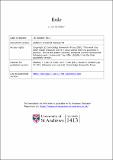Exile
Abstract
Byron rehearsed going into exile in 1809, when he was twenty-one years old. Before setting sail for Lisbon, he wrote, “I leave England without regret, I shall return to it without pleasure. – I am like Adam the first convict sentenced to transportation, but I have no Eve, and have eaten no apple but what was sour as a crab and thus ends my first Chapter” (BLJ 1: 211). Byron’s sardonic perception of himself as a biblical exile foreshadowed the allusive character of his second longer-term exile at the age of twenty-eight, when his carefully staged exit required an audience (some of the same friends and servants), expensive props (a replica of Napoleon’s carriage) and a literary precursor. On his last evening in England, Byron visited the burial place of the satirist Charles Churchill, and lay down on his grave. It was a performance of immense weariness with life and solidarity with an embittered outcast.
Citation
Stabler , J 2019 , Exile . in C Tuite (ed.) , Byron in context . Literature in context , Cambridge University Press , Cambridge , pp. 31-37 . https://doi.org/10.1017/9781316850435.004
Publication
Byron in context
Type
Book item
Collections
Items in the St Andrews Research Repository are protected by copyright, with all rights reserved, unless otherwise indicated.

